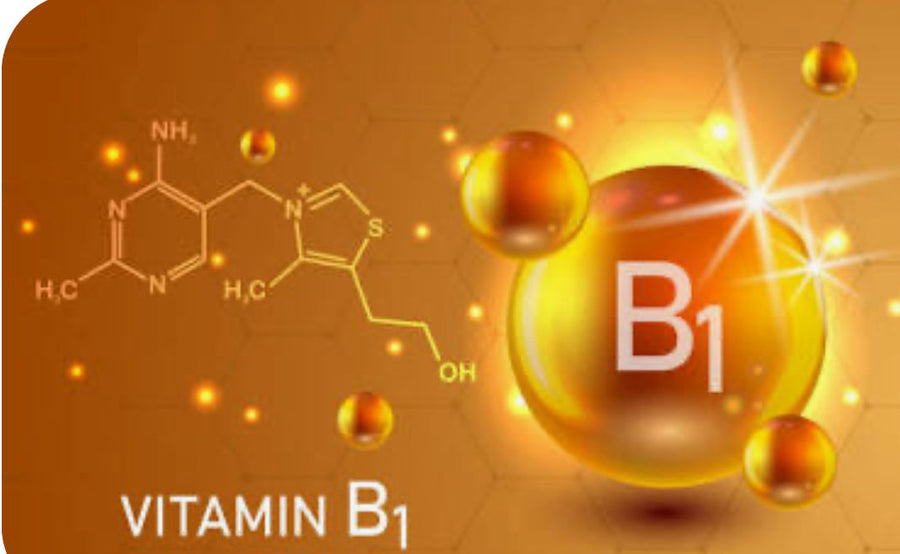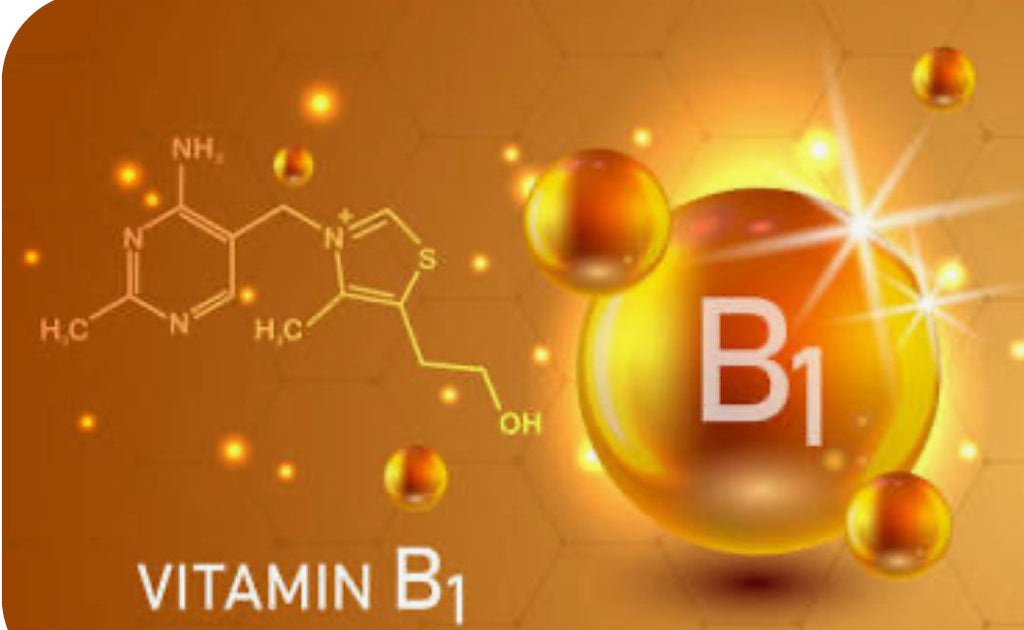Importance of Thiamine (B1) # HP-EVOO - Blog #109

Hello Everyone! Welcome back to another Friday blog. Today I want to highlight the importance of Thiamine - B1, why most of us are deficient, and what we can do about it. Did you know that Thiamine is like the quarterback of your vitamin and mineral team? When we are deficient, it won't matter if all other nutrients are available, they can't do their job. "A large body of research dating back decades, suggests TD (thiamine deficiency) is neither rare nor limited to the traditionally defined populations, but that it is simply under-recognized." Let's delve in.
Thiamine (B1) is required for your mitochondria to make ATP (energy). It is a cofactor of pyruvate that generates acetyl coenzyme A in the Kreb cycle (citric acid cycle). B1 literally speeds up your metabolic engine, increasing tissue demand for micronutrients. B1 is crucial for mitochondria to process your macronutrients. Interestingly, it requires 2X the levels of B1 to process carbohydrates as it does protein or fat. Furthermore, your microbiome requires B1 and will consume it before you can absorb it. If you are low in B1, your microbiome suffers. Microbes in the gut require B1, along with B9 (folate), for butyrate production. Butyrate is one of the primary short-chain fatty acids produced by the gut microbiota that are signaling molecules. Butyrate is the primary fuel of enterocytes (intestinal cells). it is the fuel that keeps your tight-junctions closed tightly in both the blood brain barrier and gut - preventing leaky gut and leaky brain. It also binds to intestinal L-cells that produce GLP-1 (Ozempic and other GLP-1 mimicking drugs) that control appetite. B1 is a key participant in glucose uptake from the blood, controlling blood glucose levels.
Butyrate production by your microbes directly depends on the presence of 2 vitamins: B1 and folate (B9), required by auxotrophic gut microbes (unable to produce vitamins and growth factors) that are butyrate-producers. Many species are relying on vitamins supplied from the diet or from other members of the microbial community (prototrophs). Absence of B1 and B9 impair the growth of multiple auxotrophic gut microbiota. Several strains lack the genes and biosynthetic pathways (partially or completely) for biosynthesis of cofactors related to B1, B2, B3, B5, B6. However, most strains are largely prototrophic (able to synthesize their own growth factors and metabolites from inorganic material - for all amino acids apart from tryptophan. The absence of tryptophan inhibits at least 3 strains. This is important because tryptophan is CRUCIAL for neurological health as it is the precursor to serotonin, melatonin, tryptamine, niacin, NAD+, NADP+ and kynurenine (neuroprotectant). Low levels contribute to sleep disorders, depression, cellular metabolism, biosynthesis of fatty acids, cholesterol, nucleotides and amino acids, and aging.
A keystone species in our microbiome, F. prausnitzii, has the highest number of vitamin auxotrophies and is unable to grow in the absence of B1. It also requires higher levels of all B vitamins, but especially B2, B6, B9, B12 to increases its numbers. Interestingly, this is one of the primary gut species wiped out with long Covid. One way to revive them is consuming polyphenol and fiber-rich vegetables and supplementing B vitamins.
Okay, so it is evident that our mitochondria and gut microbiome rely heavily on B vitamins, with B1 being the proverbial quarterback. We can rationalize that organs and tissues that require high amounts of ATP for energy will suffer. When looking at diabetics, "frank deficiency was found in 98% of the study population using plasma and urine samples." Deficiency is also found in obese patients. It is estimated that up to 38% of pregnant women may not be consuming enough and are deficient. "A 2002 study reported the vitamin profile in 563 pregnant New Jersey women at different points across the pregnancy. They found a trend towards too much folate, riboflavin, biotin and pantothenate and too little niacin, thiamine, and vitamins A, B6, B12, suggesting that prenatal vitamins neither appropriately nor sufficiently address maternal nutrient demands."
Knowing that the brain is an energy hog, it makes sense that some of the symptoms of deficiency would be neurological. Other organs that require high levels of energy include the liver, pancreas, kidneys, heart and thyroid. B1 is involved in carbohydrate metabolism, so insulin resistance and type 2 diabetes can result when deficient. It also makes sense that the barriers to the environment require high energy as well - this is the lining of the gut, the skin and hair. "Early signs of thiamine deficiency include peripheral neuropathies in adults and adolescents and fussiness and irritability in infants. Weakness, nystagmus, ophthalmoplegia, ataxia, and cognitive impairment accompany progression of the disease." In community dwelling elderly, a study found thiamine deficiency in 50% of the subjects - despite consuming greater than the recommended daily intake.
Let's take a look at some of the symptoms that can occur when you are deficient. This is not a complete list by the way.
B1 deficiency symptoms:
OCD/ADD/ADHD/concentration difficulty
Alzheimer’s/memory
Amnesia
Autism
Autonomic nervous system dysfunction - (ex) Blood pressure dysregulation
Anxiety/panic
Depression
Vagus nerve dysfunction in gut
Decreased navigation capacity (hippocampus)
POTS (postural orthostatic tachycardia)
Light-headedness
Peripheral neuropathy/paresthesia
Mental stress
Altered mood
MS symptoms
Ataxia/balance/gait/clonus/dysarthria/clumsiness/dyscoordination
Restless leg syndrome
Tourette syndrome/twitching/ uncontrollable movement
Stress intolerance
Fatigue
Hiccups
Hypothyroid
Sensitivity to light and sound
Cataract formation
Eye inflammation - lens of eye
Optic neuropathy/diminished tears
Hair loss
Chronic chapped lips
Sinus drainage
Inhibits Pancreatic enzymes
Inhibits HCl (hydriochloric acid) in stomach
GERD (gastroesophageal reflux)
SIBO/SIFO (small intestinal bacterial overgrowth/small intestinal fungal overgrowth)
Decreased sense of smell
Genital anesthesia
Hand paralysis
Irregular heart rate - racing at times
Cardiovascular function
Respiratory function
Goosebump skin when not cold - 2° demyelination
Trigger finger
Mitral Valve prolapse/valve problems
Decreased energy/loss of inertia
Morning sickness/nausea
Recurrent ear infections
Fibromyalgia/ Muscle pain
Chronic fatigue Syndrome
SIDS (sudden infant death syndrome)
Baker’s cyst
Diminished peristalsis
Sleep apnea
Raynaud’s syndrome - autoimmune
Increased sweating
Blurred vision
Speech dysfunction
Hearing impairment
Incontinence
Did you realize that the thyroid is the proverbial "canary in the coal mine" - it alerts you that there is an issue in the body. We don't recognize this and assume we have a thyroid problem. The first line of treatment with allopathic medicine is often to you a low dose thyroid hormone replacement, such as levothyroxine (Synthroid) - often this does not help us feel better - because it is not addressing the root cause. We may initially see skin issues, experience digestive issues and neurological issues - we are not recognizing the underlying systemic problem.
Not only is thiamine is required in higher amounts in tissues that require high energy, but we can have more deficiency in one area than another. We tend to eat a diet that requires thiamine in higher amounts - and we aren't replenishing. Glucose nitrates enterocytes, while fructose depletes ATP from enterocytes making them weak and unable to fully close tight-junctions - this causes leaky gut. Further, we don't feed our microbiome appropriately and often lack the strains that are making B vitamins. B1 gives energy to oligodendrocytes that make myelin. Low B1 causes neuropathy and contributes to MS. To further complicate the problem, thiamine uptake requires two transporters that live in the small intestine. These transporters shut down when there is inflammation present. We end up slowly getting worse until entire organs are involved/affected.
What depletes B1?
- High carbohydrate diet - refined sugar and grains - polished rice
- Antacids - increase pH, prevents absorption of vitamins and minerals
- Diuretics - increases excretion
- Caffeine
- Sulfites
- Alcohol
- Raw fish
- Tea and coffee
- Metformin
- Chlorine
- SSRIs - anti-depressant drugs
- Birth control pill
- Antibiotics - particularly cipro
- Seizure medications
- Organophosphates - glyphosate, pesticides, herbicides
- Other chemicals and toxins
- Heavy metals - mercury, lead, cadmium, aluminum -vaccines
So, what can we do to correct the situation?
- Lower the glucose load on the mitochondria, as this drives inflammation and depletes our B vitamins.
- Decrease inflammation - HP-EVOO comes to the rescue. The powerful polyphenols not only scavenge ROS (reactive oxygen species) but feed the microbiome and mitochondria. EVOO provides fatty acids as a major fuel source for enterocytes and organs that demand high energy - as well as healing the gut lining and the blood brain barrier.
- Time-restricted eating. This allows time for autophagy to clear toxins, cellular debris and lower glucose and insulin.
- Get your vitamin D3 levels up 70-100 on blood test.
- Increase fiber in the diet to feed the microbial strains that produce B vitamins.
- Take a good B complex, magnesium and vitamin C - as they are required to absorb and work together
- Take a fat-soluble form of Thiamine that does not require transporters to be absorbed:
-
TTFD - (tetrahydrofurfuryl disulfide) - this fat-soluble form is AMAZING with extra sulfur groups attached. This helps with detoxification as well. This form works to REVERSE the following disorders:
- address any functional gut issue, such as SIBO (small intestinal bacterial overgrowth)
- Intestinal motility
- Leaky gut
- Restores function in Vagus Nerve and enteric neurons
- Ameliorates POTS (postural orthostatic tachycardia syndrome)
- Dysautonomia
- Autism
- Depression
- Autoimmune Dysfunction
-
Benfotiamine - fat-soluble form that also has extra sulfur.
- Alzheimer's
- Peripheral neuropathy
- Anti-inflammatory effects
- Sulbutiamine
- ADD/ADHD (attention deficit disorder/hyperactivity)
- focus
- OCD (obsessive compulsive disorder)
- Motivation
- Highly dopaminergic
-
TTFD - (tetrahydrofurfuryl disulfide) - this fat-soluble form is AMAZING with extra sulfur groups attached. This helps with detoxification as well. This form works to REVERSE the following disorders:
So, until next time my friends…Drink, Drizzle, Digest HP-EVOO at least 4T raw daily, - use more for cooking and drizzling/pouring onto your food - eat the rainbow of organic or wild-sourced or organic veggies (7-9 C) and low-glycemic fruits (to get the rainbow of gut microbes!) - eat wild-caught, pasture-raised, grass-fed - get plenty of sunshine - supplement magnesium, zinc, vitamin D3 + K2 - get your trace minerals and electrolytes with good sea salt - Celtic is hand-harvested and Himalayan was formed before plastics - eat foods high in lutein - drink your body weight in oz of water - get a good pre/probiotic - consume digestible and indigestible fiber for your gut microbes - adaptogens (such as mushrooms) and methylation donors (kale, beets, spinach, cruciferous, lion’s mane…), marjoram, rosemary, oregano, parsley and other herbs to detox, enhance overall health and reverse aging and disease - exercise your body and mind - add a few minutes of mindful meditation to your day to combat stress - take a hot Epsom salt bath and follow with a cold shower/cold plunge - practice “earthing” as an anti-inflammatory - remove EMF (electromagnetic frequency) devices and blue light - use IR (infrared) from incandescent lighting, non-toxic candle or light a fire to enhance sleep and...turn off the light!! #HP-EVOO
This blog is intended for informational purposes only. Discuss strategies with your Healthcare Practitioner.






